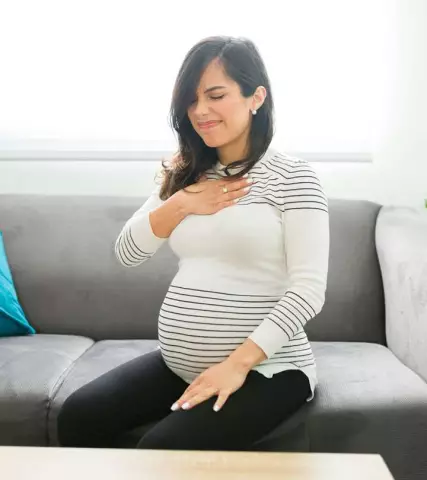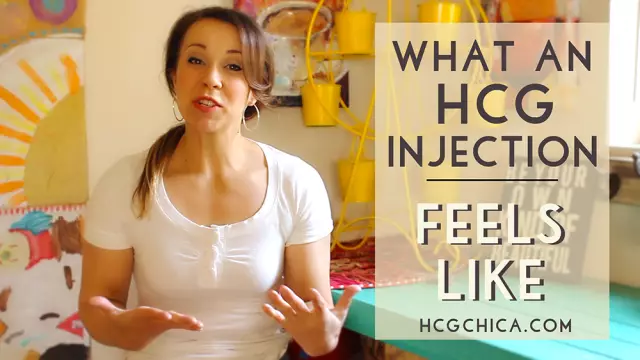- Author Rachel Wainwright wainwright@abchealthonline.com.
- Public 2023-12-15 07:39.
- Last modified 2025-11-02 20:14.
Pregnancy during quarantine: myths and truth
Pregnancy is a wonderful, but extremely crucial period in a woman's life. Often the joy of the birth of a new life is overshadowed by fears and anxieties about the health of the baby. In an epidemic and quarantine, fears are exacerbated - expectant mothers are worried about the risk of catching the virus and how this may affect the child.
In order to prevent fears from dominating positive emotions, let's try to figure out what information about the coronavirus can be trusted: what to fear in reality, and which statements are just myths.

1. Pregnant women are more susceptible to coronavirus, and their risk of complications is higher than that of other people
It is a myth.
Pregnant women are sick with coronavirus, but today in the world not a single death has been registered among pregnant women and women in labor with COVID-19.
According to the World Health Organization, pregnant women are not at high risk due to the epidemic. And some experts believe that expectant mothers tolerate coronavirus even easier [1], and for them it is no more dangerous than any other viral infection.
2. The disease in pregnant women can entail risks to the health of the child
Unfortunately it's true.
There is a risk, although scientists cannot yet assess its degree. Like any viral infection, coronavirus during pregnancy can lead to serious consequences, including miscarriage or freezing of pregnancy. Therefore, the main task, especially in early pregnancy, is to try to avoid getting any viral infection, including coronavirus.

3. Pregnant women should not visit the antenatal clinic during the quarantine period
It's true.
During the quarantine period in most regions of Russia, expectant mothers are not recommended to attend antenatal clinics unless absolutely necessary.
Medical examination of pregnant women is planned to be carried out at the patients' home. If you are expecting a child, be sure to inform your doctor about where exactly you will be during the quarantine period.
4. Coronavirus is transmitted in utero - from mother to fetus
There is no hard scientific evidence yet on whether COVID-19 is transmitted in utero. The research results are contradictory, but judging by medical statistics, then, as a rule, coronavirus is not transmitted that way.
In China, 9 cases of atypical pneumonia in women in childbirth, which arose as a result of infection of women with coronavirus, were investigated. At the same time, the blood test of newborns for COVID-19 was negative, and the virus was not detected either in the amniotic fluid, nor in the umbilical cord blood, or in breast milk. [2]
True, one case of the disease in a newborn was nevertheless recorded - on March 14 in London, a woman with a coronavirus gave birth to a child, whose test for COVID-19 was positive immediately after birth. Doctors cannot yet say for sure when the child became infected - in the womb or at birth.
In any case, the baby can become infected after birth, therefore, doctors recommend separating the newborn from the mother if she is suspected of having the virus.
5. Babies are at risk due to the fact that they are difficult to tolerate the disease
This is not true.
Newborns are not considered to be at risk. Infants tend to be more severely ill than older children, but easier than adults.
At the same time, doctors admit that the course of the disease can be quite severe in children who were born prematurely or with congenital lung problems.

6. Pets carry coronavirus infection
It is a myth.
Dogs and cats can get coronavirus from their owners, but they cannot infect humans.
7. Medical mask protects against coronavirus
Unfortunately, a medical mask cannot completely protect us from possible infection with diseases that are transmitted by airborne droplets, including coronavirus. But you can still reduce the risk of infection by using a mask. To do this, you must strictly adhere to the rules for using a medical mask:
- Wash your hands thoroughly with soap and water before putting the mask on your face.
- When wearing, try not to touch the mask with your hands or other objects.
- Change the mask every 2-3 hours or as soon as it gets damp.
- When removing the mask, do not touch the part of it that covers the face with your hands. Pull the mask on the earloops, discard it, and then wash your hands immediately.

8. When it gets warmer, the virus will disappear
There are no studies yet to confirm that high temperatures can stop the spread of COVID-19.
Three out of four coronaviruses that can cause respiratory illness in humans are indeed seasonal and nearly disappear in the summer. But it is not yet known whether the new virus will behave this way.
9. Garlic will help protect against coronavirus
It is a myth.
Garlic itself, of course, is useful, but it cannot help in any way with ARVI or coronavirus. There is no scientific data that would reliably confirm that garlic really protects against viral diseases.
10. Vitamin complexes will help protect against the virus
This is partly true.
The fact is that the body is more at risk of contracting viral diseases against the background of reduced immunity, which is caused by a lack of micronutrients (vitamins and minerals). And most of all, the body needs external support in the spring, because in winter we, as a rule, do not receive micronutrients from food.
To strengthen the immune system, try to eat right, take vitamins. Pay attention to the Pregnoton Mama complex, which is specially designed for women during pregnancy and lactation. Pregnoton Mama contains 16 essential ingredients for mom and baby, including methyltetrahydrofolate (a highly active form of folic acid - Extrafolate ™), liposomal iron (Lipofer ™), Omega-3, a combination of Selenium + Zinc + Vitamin C, as well as vitamin E and vitamins group B. These components are needed by the expectant mother both for the prevention of ARVI, and for the well-being of a healthy pregnancy, the correct growth and development of the baby. It is recommended to start taking Pregnoton Mom during pregnancy and continue taking it after discharge from the hospital while breastfeeding.

11. Essential oils can reduce the risk of infection
Certain essential oils have been scientifically proven to have antiseptic, antiviral and antibacterial properties. Compositions of such essential oils are often used to prevent respiratory viral infections. Of course, essential oils cannot cure COVID-19. But using them, we create an additional barrier for the virus to enter the body.
In pharmacies, you can buy Dyshi's products - oil or a patch-inhaler. These are products based on pure essential oils with antiviral and antibacterial effects, which are recommended for the non-contact prevention of ARVI and the reduction of cold symptoms.
It is very easy to use them. For example, the Breathable inhaler patch is glued to clothing to protect against viruses if you leave the house.
Breathe Oil in spray form can be sprayed indoors and Breathe Oil in a dropper bottle can be applied to clothing. Evaporating during use, essential oils disinfect the inhaled air and thereby help reduce the risk of contracting ARVI, as well as reduce the symptoms of the common cold and its complications.
The effect of the Dyshi Oil and Inhaler Plaster has been clinically tested - 20 studies have been conducted with the participation of more than 1200 patients. Means Breathing can be used continuously throughout the entire period of the epidemic for both children and adults.

The main recommendations for expectant mothers during an epidemic are to reduce contact with other people and follow standard prevention measures.
Try to stay calm and be positive, even though this is not easy right now. Instead of reading scary news and posts from panicked social media, devote time to creativity and self-development: sign up for some useful online workshops, do handicrafts, or even just sort out your wardrobe.
Be healthy!
[1] Health workers in the United States told how to give birth with coronavirus
09:23 02.04.2020 - RIA Novosti
[2] COVID-19 in pregnant women. Manuel B Schmid, Jehudith Fontijn, Nicole Ochsenbein-Kölble, Christoph Berger
Dirk Bassler - The Lancet. March 17, 2020
Found a mistake in the text? Select it and press Ctrl + Enter.






